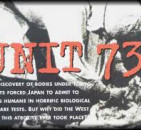Unit 731 (731部隊 Nana-san-ichi butai, Chinese: 731部队) was a covert biological and chemical warfare R&D unit of the Imperial Japanese Army that undertook lethal human experimentation ( vivisection, human damage done by burns, freezing, high pressure, bullets, etc) during the Second Sino-Japanese War (1937–1945) and World War II. It was responsible for some of the most notorious war crimes carried out by Japanese personnel. Due to the number of test subjects available, Unit 731 was based at the Pingfang district of Harbin, Northeast China. Japanese Imperial Army's Unit 731 killed thousands of Chinese and Russians held prisoner in Japanese-occupied Manchuria, in experiments to develop chemical and biological weapons.
establishment of two biological warfare Units 731 and 100 in Manchuria in 1933 implied the further catastrophes. The Japanese army regularly conducted field tests to see whether biological warfare would work outside the laboratory. Planes dropped plague-infected fleas over Ningbo in eastern China and over Changde in north-central China and plague outbreaks were later reported. Japanese troops also dropped cholera and typhoid cultures in wells and ponds, but the results were often counterproductive. In 1942, germ warfare specialists distributed dysentery, cholera and typhoid in Zhejiang Province in China. But Japanese soldiers themselves became ill and 1,700 died of the diseases. An estimated 440,000 Chinese died of this germ warfare.
- Μέρος του λόγου: proper noun
- Κλάδος/Τομέας: Στρατιωτικά
- Category: World War II; General military
Δημιουργός
- HOSEOKNAM
- 100% positive feedback
(Beijing, China)






